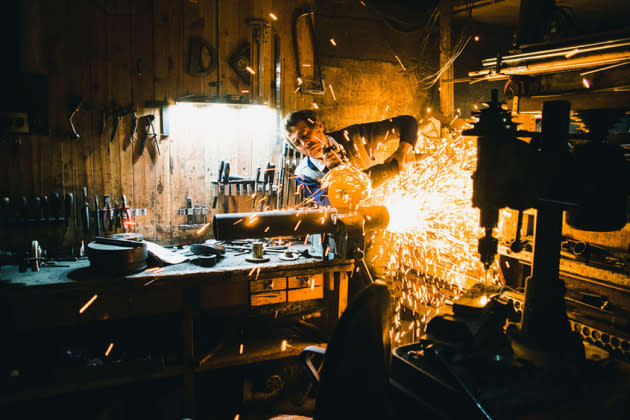‘Garage People’ Director Natalija Yefimkina Enters the Secret World of Russia’s Man-Caves

Inspiration can strike at any time, but for first-time director Natalija Yefimkina it came from an unlikely source. “In the garage, I found everything,” says the 37-year-old, a Russian-speaking Ukrainian now based in Germany. Presented in IDFA’s Best of Fests strand, following its debut at the Berlin Film Festival and more recent AFM screening, her film “Garage People” looks at the different ways in which Russian people use their garage spaces for personal expression.
The idea to make a film about such an esoteric subject came to her while working as a crew member on a feature film shot in Russia. Although she has never been to film school, Yefimkina has worked on many TV and film sets since the age of 19, and a feature shoot in the Kolar peninsular area saw her taking charge of the extras. Exploring the local eco-system, she realized that everything she needed—props, equipment and more—could be found in someone’s garage, and so she struck upon the idea of making a film about the strange goings-on she began to see there. “Garages are the symbol of every Russian city,” she says.
Just days before she got the final piece of funding to enable the first shoot to take place, Yefimkina discovered she was pregnant, so when she went to make the movie, she was breastfeeding in between takes and employing her mother-in-law as her babysitter. More complications were to follow. Over the course of the production, her cameraman suffered a serious injury, postponing one of the shoots, and Yefimkina saw two editors exit after a frank exchange of views. “I didn’t realize that I was a perfectionist before,” she says. “But at this moment, I understood that if I believed I could make the film better, I should try to do it. No one trusted me because I’m a woman, and I’m a first-time director—everyone said, ‘You just don’t know what you want, because it’s already good enough.’ So it was kind of hard.”
It took Yefimkina four years to make the film, earning her subjects’ trust with stories about her Ukrainian and Russian background (her father is Russian), and her bonhomie is evident in the endearing way she interacts with her subjects. “It’s how I approach people,” she says. “I try not to judge them and to appreciate them. [For some] the garage is a space for entertainment, but for me, what was most fascinating was they were a place for dreams.”
On her travels, she finds garages being put to all kinds of uses: a home for chickens, a place for band rehearsals, a studio for a priest to carve religious icons, somewhere to house a collection of military paraphernalia…. Pictures of President Putin are hanging on walls, even in the outskirts of a Russian mining town, yet the garages are also a place of freedom, where these people—mostly men—can be themselves. “It’s almost only men,” says Yefimkina, “because it’s a place you can do everything [you want], where you can be loud, where you can pull things apart, and you can’t do this dirty stuff at home. Sometimes you see women, but it’s usually the wife. Of course, in the band [in the film], you see a woman, but in general, it’s a man’s world, which interests me.”
In addition, she also saw these characters as a way to demystify Russian society: “I wanted to tell the story of Russia from the viewpoint of the people with the least. I wanted to show how people adapt, keep their humor and survive, no matter how difficult life can be.”
The rapturous international reception to the documentary has been proof that her original instincts were correct. She’s now ready to go again, and this time, with some developing funds from the Federal State of Germany, she wants to put German society under the microscope. Like “Garage People,” it will cast its net wide. “I like to work with a lot of protagonists,” she says. “I’m not interested in individual stories. For me, the German film is also about the longing of society, the search for sense in society, so it’s not a story fixed to one hero. Now I have to find the protagonists that I want to shoot, [and] the common language. Filmmaking is a lot of trial and error.”
More from Variety
Best of Variety
Sign up for Variety’s Newsletter. For the latest news, follow us on Facebook, Twitter, and Instagram.

 Yahoo Finance
Yahoo Finance 